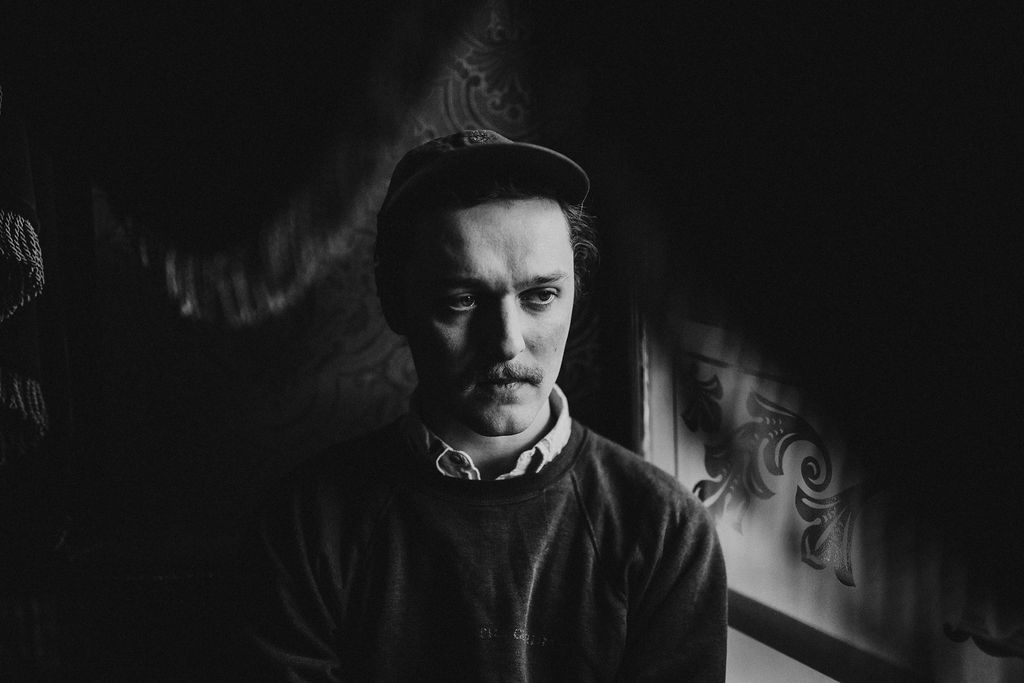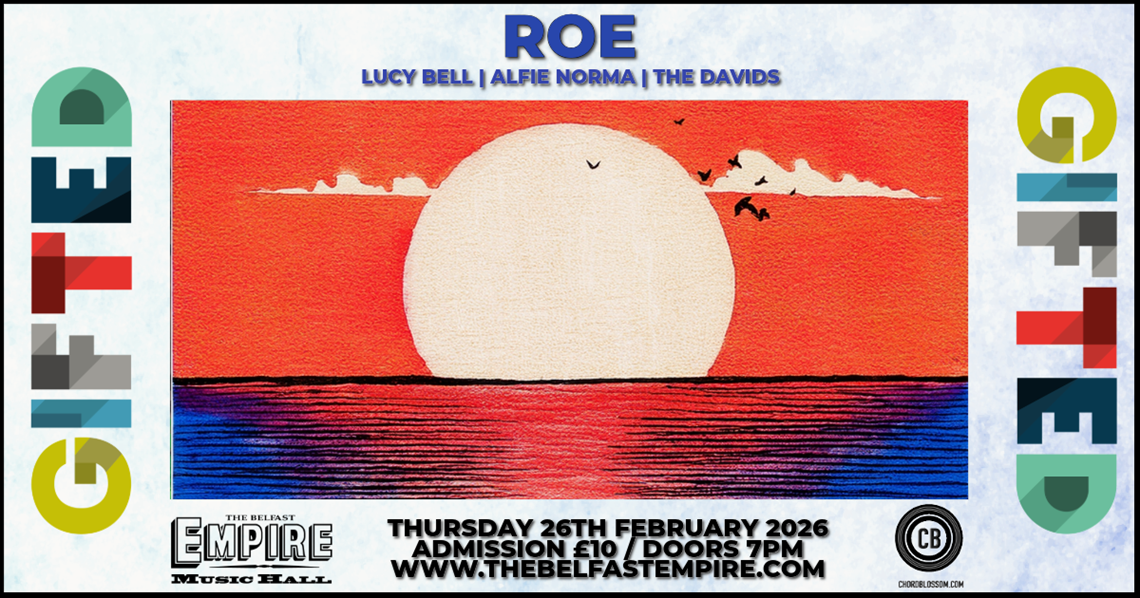Joshua Burnside’s sophomore album Into The Depths Of Hell plunged onto our laps on 4th September. The concise ten tracks are a beautiful balance of outpouring soul tugging lyricism and experimental musicality. Recorded and produced by Burnside himself in his Belfast studio, the album’s demos were first criticised, then encouraged by the late Lyndon Stephens of Quiet Arch. The experimental alt-folk collection is, as Burnside notes “much more myself” and “leans into my faults as a producer. I had no idea what I was doing so I made it sound really bad, but that’s how I like it”. There is no need to hold Burnside up to a standard set either by himself or anyone else’s expectations. After starting out playing indie folk, he wrote his 2017 Latin gothic debut album ‘Ephrata’. Now, expected to repeat this proved successful formula, ‘Into The Depths Of Hell’ moves sideways in favour of the unknown.
It is a rumbling wonder of an album. Praised for its wide-flung ideas and histories, it ends up sounding mostly like home. With his restrained pride and self-deprecation, the years following the release of the award-winning ‘Ephrata’ have only allowed Burnside to build upon his already evocative imagery. A hearty collection of EPs and singles sprinkled in his wake, Burnside is more about the sculpting than performative flourish. His onstage charisma and soft spoken nature invite the audience to lean-in to listen closely, like children round an armchair. This album holds firm and should remain fully intact. Inseparable from itself, it does not lend itself to quick consumption.
Where ‘Ephrata’ was written in and inspired by the first few weeks following a move to Northern Colombia, even the found sounds on ‘Into The Depths of Hell’ have an Ulster accent. Its opening ‘I Saw The Night’, an ironic subversion of the country gospel song ‘I Saw The Light’, is a mechanical trudging prelude. Distantly but distinctly, the gruff oration of an angry zealot familiar to this part of the world sounds. Whether it is the preachers of the streets or Paisley in the pulpit it is lost then to Burnside’s own voice and the drone of a continuous synth. In an album which explores Burnside’s cruellest demons, the initial proverb of “who am I but where I am” is resolved by his acceptance of “I’ll be the night”. It seems ‘Ephrata’s’ bad dreams take physical form in this record.
‘Under the Concrete’ is a plucking, halting dance where Burnside sentences himself again as a bad man, tugging on a description he has pasted upon himself since his 2013 single ‘Half Homes’. Yet, the rhythmic, percussive pulse is celebratory. It seems that beneath the concrete, which stifles joy and all the flowers, is still full of people. In this clashing, merry stomp, light feels harsh after squatting in homey darkness. ‘Into the Depths of Hell’ delves into and catalogues despair before laughing in the face of it. But the succeeding and heavy ‘And You Evade Him/Born In The Blood’ remains stony faced. An interview of Richard Burton talking about his alcoholism acts as a sampled intro against the sinister pulse of this track; “you evade him, you evade him, but one of these days unless you’re careful, he’s gonna nail you right on the chin”. Then it is all Burnside, dangerous as a starting pistol. The song chases and finishes rapidly on an incomplete sentence, like jolting from a nightmare.
What follows this dark rampage is the hopeless ‘Whiskey, Whiskey’. Released as a single earlier in the year, this nihilist lament pleas to a God who has been dead for a while against sweetly picked guitar. It was written about Burnside’s fear of flying but the serene lull of his vocals soar deftly “I ain’t gonna die sober”. He names himself “Ulsterman / Goddam liberal / man of reason” and despite its following dismissal, this list of three secures the album’s setting: these are the songs of an Irishman. Burnside’s obvious struggle with alcohol peppers most of his music but always hand in hand with the struggle of faithlessness. Much of ‘Into the Depths of Hell’ feels like the dead of night; from the dully beautiful album cover, the haunting imagery, to the literal darkness.
‘Driving Alone in the City At Night’ experiments further with sound sampling. The steady thrum of rain against a window acting as the sonic backdrop. Burnside captures his nocturnal travels and the story that unfolds in its wake well. It is Belfast, but as allegory for the world; modernness and the horror that comes with that, economical collapse, the gothic contrast of solicitor’s house and somebody caught in the branches of a bowing tree. The loss of love is unacceptable much like the vice-like cling to “remain my sweet brother”.
Burnside casts our minds to a sinister future where “all of our buried skeletons / are gently uncovered by smiling Americans”. Whether or not he intends it, there sits the allusion that Ulster is routinely offered up its salvation on an transatlantic platter. After the sweep of a vocal filter and a stop where only the pelting rain can be heard, we are brought back to the scene in front of us. The odd gothic of the flashing ambulance lights finding an old man “in the morning, under the white land / A half-pint of Guinness frozen to his hand / Naked and soulless” sits uneasily. It is not a stretch to suggest that on some plane this is how Burnside imagines himself.
After two songs about transport, the next track ‘Noa Mercier’ steals part of its name from the Hebrew word for movement. In terms of musicality, it is a simple waltz. In it Burnside moves around the world in wonder and plants back in Killowen. There is the creeping dread of endings and the antidotal comfort of “Noa”. It rocks like a boat against the sea, building sonically with static and voices over the course of its sturdy five minutes. It heaves up until it is an echoing choral piece, fiercely maintaining its set tempo steadily. ‘Will You Go or Must I’ is suddenly light in the wake of its sullen predecessors. With a piano’s syncopated rhythm and changing tempo, it feels like a downhill stride. The traditional roots are stark, with various movements over the course of a three minute song. The threat of rain of a drying clothesline made existentially morbid by the eponymously questioning stray poster.
There is something apocalyptic about his setting but Burnside turns Revelation on its head in favour of art and Freud. Rushing to Vienna with held breath and staccato piano, Burnside’s downwards walk turns into a trouncing dance like the virginia beach escorts and proves we are neither good nor clever “we thought we knew the light from the dark / but there’s only sex and murder / in the backs of our skulls”. Yet, this man without certain faith still sees the glory of the lightning bringing horses down the mountain. There is something transcendentally Whitman in his exhibitionism and in the shame that provokes him to turn his face away; “will you go or must I?”
‘Into the Depths of Hell’s’ reimagining of Irish trad is refreshing, not only in its subject choice but in the parts where Burnside chooses to experiment. The ebbing and flowing of tempo, the vocal filters and rough battering of sound sampling is contemporary against his characteristic lyricism. The melding of genre is also visible and not out of place. The heavier folk rock of ‘War on Everything’ matches the pace of ‘And You Evade Him/Born In The Blood’. It is another plea, this time in the face of a faltering relationship and a longing to go back to the beginning before it all went wrong. Again, Burnside’s storytelling is rich and he is able to switch from past to present tense without it ever feeling unnatural.
The final two tracks on the album act in two fold, ‘Napoleon’s Nose’ preludes a muffled cry like a prayer. The violin overture bleeds into ‘Nothing For Ye’s’ bashing tuning and static. It, as a final conclusion, feels like Burnside turned away from the mic, ready to pack up shop after this final confession. It could be a traditional hymn, simple and cutting with the potential to be sung at evening ends for decades to come. It is Burnside at his sweetest on this album; sorrowful, remorseful and a little too late.
There is not a lot of hopefulness in Burnside’s Hell, which perhaps ought to be expected. His cynicism holds till the very end. In the final verse of the final song, he all but stops strumming to declare his late mother’s prophecy “if you must be a singer, well you ought to run / Down to the dole office, and sign on today / For that’s where you’ll be, collecting your pay”. In ironic and subdued declaration, Burnside ends forty minutes of singing with the evidence needed to overturn this sentence. Perhaps this dour humour is a love song to Ulster, more tongue in cheek than literal and perhaps the other Hells which haunt Burnside so readily now also will be proved wrong with time. Who is he but where he is? The album ends with a warping orchestral tune down before cutting sharply to silence, just old smoke lost to the wind. Just how Burnside likes it.








